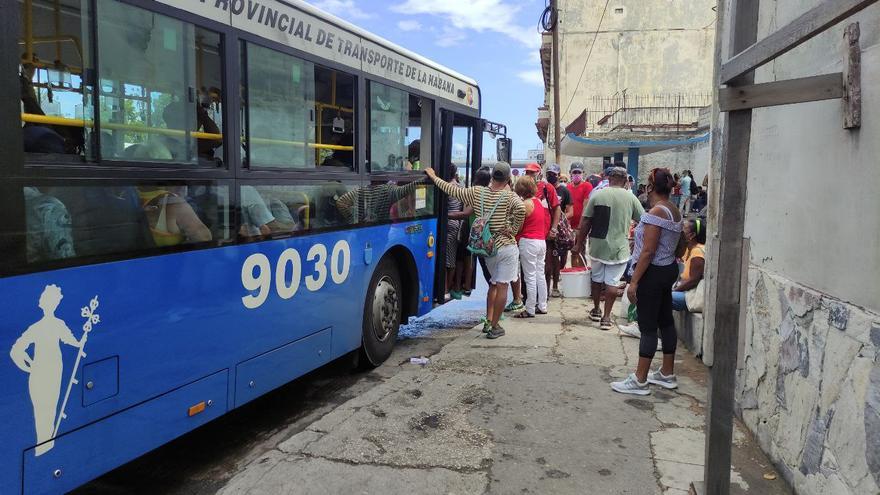
![]() 14ymedio, Havana, 8 April 2022 — The Havana authorities have not yet found a solution to the serious mobility problem that afflicts the capital province. This week, the general director of transport, Leandro Méndez Peña, admitted that only 45.7% of the buses are available, which means that there are more out of service than circulating on the streets.
14ymedio, Havana, 8 April 2022 — The Havana authorities have not yet found a solution to the serious mobility problem that afflicts the capital province. This week, the general director of transport, Leandro Méndez Peña, admitted that only 45.7% of the buses are available, which means that there are more out of service than circulating on the streets.
To alleviate the situation, the Government plans to have the agencies with assigned cars contribute* to the transport of passengers, which would increase the available seats by 40,000 every day. However, the measure – which Méndez Peña recognizes as insufficient – does not work due to the refusal of users of state vehicles to comply with this obligation.
The General Directorate of Provincial Transportation of Havana warned that the measures to be taken will be more severe with those who fail to comply with the order. “We are forced to increase the demand on the cars assigned by state entities so that they comply with what is established in these situations and provide service to the stops,” said Mendez Peña.
According to the official, the situation worsened with the fuel deficit of last week, when it was necessary to ration precisely to cover the needs of public transport. The work and school transport companies were affected, when they contribute 255 vehicles to the mobility of the province.
To ensure that the requirements are met, the authorities have provided for the presence of 290 inspectors and employees of the General Directorate of Transport in the 311 busiest pick-up points.
According to what they said, the Gacelas — shared/routed minivans — and private boteros [literally ’boatmen’ — taxi drivers] are being used to complement mobility, but the official press, present at the event, wanted to know more about the rates. The answer was that new prices are being studied stretch-by-stretch to “compensate private carriers for the expenses,” which will mean an increase in the cost of the journeys. Months ago, when the prices per route came up, the drivers began to use new tricks, such as dividing the routes, so as not to lose money.
The boteros complain that, with the fixed prices, they cannot cover the costs; while citizens complain about how expensive it is to travel and the tricks that drivers do to get more money from them than before.
*Translator’s note: One way this would be done would be through semi-formal ride-sharing/hitchhiking with drivers of government-owned cars obliged to stop and pick up passengers at established stops.
____________
COLLABORATE WITH OUR WORK: The 14ymedio team is committed to practicing serious journalism that reflects Cuba’s reality in all its depth. Thank you for joining us on this long journey. We invite you to continue supporting us by becoming a member of 14ymedio now. Together we can continue transforming journalism in Cuba.
